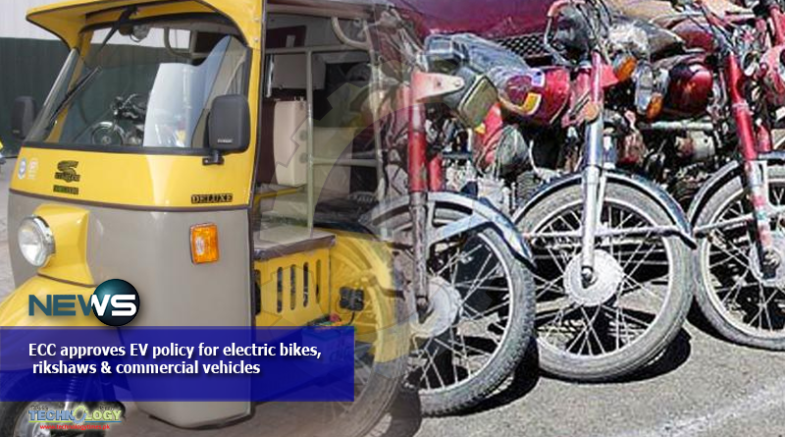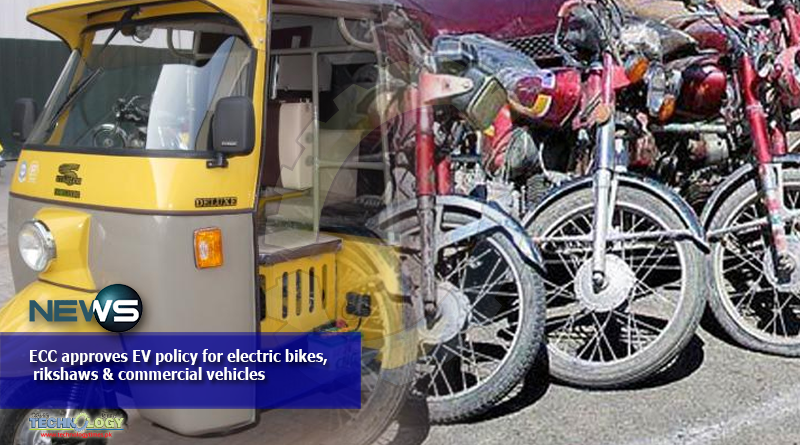Economic Coordination Committee (ECC) has approved a five-year Electric Vehicles (EV) with substantial incentives for electric bikes, rickshaws and other commercial vehicles, in specific sense this EV policy is for what are technically known as 2-3 wheelers.

Economic Coordination Committee (ECC) has approved a five-year Electric Vehicles (EV) with substantial incentives for electric bikes, rickshaws and other commercial vehicles, in specific sense this EV policy is for what are technically known as 2-3 wheelers.
In the second meeting with a consensus on electric 2-3 wheelers that are motorcycles, rickshaws, loaders and heavy commercial vehicles such as buses & trucks, the inter-ministerial committee finalized EV Policy recommendations.
The policy recommendations were agreed on after an analysis of policies prepared by the Ministry of Climate Change (MoCC) and Ministry of Industries and Production (MoI&P).
The recommendations are based on some terms these include promoting the use and manufacturing of electric 2-3 wheelers and heavy commercial vehicles;
Promoting the use and manufacturing of electric 2-3 wheelers and heavy commercial vehicles; and technology acquisition.
Encouraging EV manufacturing and reducing negative aspects of climate change through vehicle emission reduction. Also, employment generation through new investments; a reduction in oil import bill and usage of excessive electricity, and so on.
The contingent motivator being offered on 2-3 wheelers will be General Sales Tax (GST) at the sales stage for 2-3 wheelers @1% for five years, i.e., the policy period. Sales Tax at the import stage will be waived off (0%) to avoid refunds.
EV-specific parts of 2-3 wheelers will be imported at 1% Customs Duty (CD) for five years. 2-3 wheelers will be exempted from registration tax and annual token tax.
While the reduction of toll tax to 50% for EVs. Existing manufacturing regime for 2-3 wheelers with respect to non-EV parts & components will remain intact to safeguard already achieved localization. The benefits of the EV policy will be extended to both existing and new manufacturers.
The import of new EVs (2-3 wheelers) in CBU condition at the concessionary rate of customs duty (50% of prevailing rate) will be reduced to 10 per variant and capping at 200 units instead of 100 and 2000.
Heavy Commercial Vehicles (HCVs) – Electric will have 1 percent Customs Duty on import of CBUs (Electric Buses, Trucks & Prime Movers). Import of entire CKD will be allowed at 1 % Customs duty to local manufacturers and General Sales Tax @1% at sales and waived off (0%) at the import stage.
Electric Vehicles will be exempted from registration fees, annual renewal fees, permits, and reduction of toll tax to 50 percent for HCVs. Inputs for EV vendors to be exempted from duties and taxes for 5 years (applies to in-house manufacturing by OEMs also).
The funding facility of State Bank of Pakistan will encourage green investments that will encompass EV manufacturers, EV parts, components and module manufacturers, EV infrastructure development including charging stations.
Five-year income tax exemption for manufacturers of EV equipment, infrastructure development, and import of chargers with CKD to attract 1% Customs Duty and 1% Sales Tax, whereas import of charging stations for the electric vehicle under HS Code 8504.4030 is already allowed at 0 % Customs Duty and will continue as per the policy.
